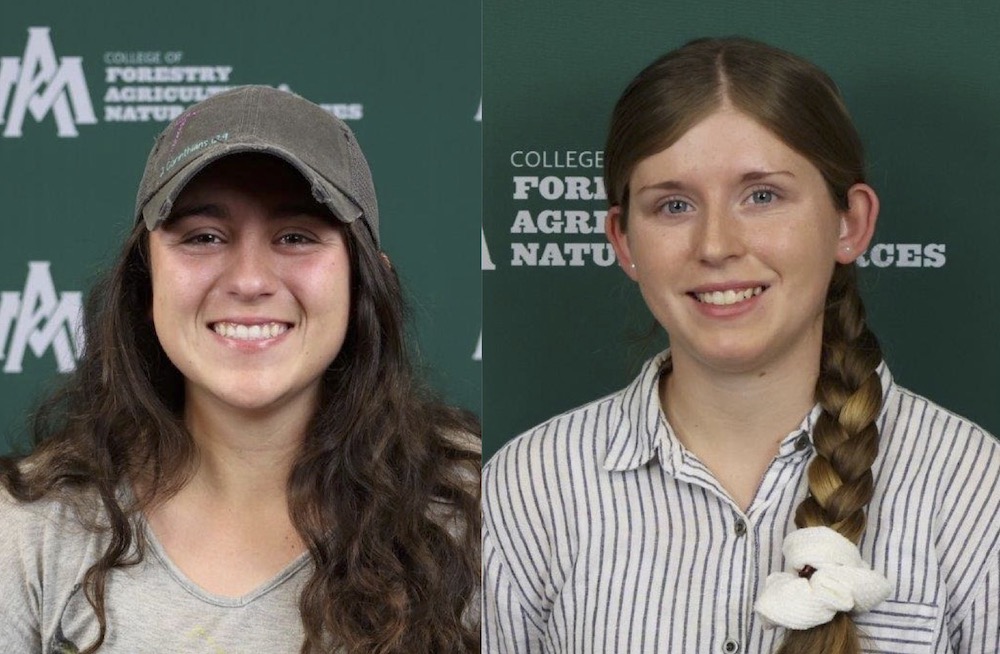MONTICELLO, Ark. – In today’s world, higher education is becoming increasingly important to succeed in any field. Veterinarian medicine is no exception, with the coursework being rigorous and demanding. However, students can get a head start on this challenging coursework by taking college-level classes in high school.
Two students from the University of Arkansas at Monticello (UAM), Codie Jo Tupa (Sparkman, AR) and Katelynn Lewis (of Beekman, LA), have benefited from taking college-level courses while in high school. Both have been accepted to veterinary schools. Tupa is considering her options between Louisiana State University and the University of Missouri. Lewis has been accepted and enrolled at Louisiana State University. Tupa and Lewis are only in their third year at UAM in the College of Forestry, Agriculture, and Natural Resources but will graduate as academic seniors in May.
Top photo: Left to right, Codie Jo Tupa and Katelynn Lewis
She knew from an early age she wanted to be a vet.
Tupa knew she wanted to be a veterinarian since childhood, so she has been preparing for this path for a long time. The University of Arkansas at Monticello has provided her with various opportunities, such as working with large animals like cattle and sheep. She credits Dr. Rocky Lindsey, an associate professor of Animal Science at UAM, for helping her through the process. Lindsey has been a great mentor, and Tupa says he has answered a thousand questions in the past two semesters alone.
Tupa is quick to credit her parents. Sacrifices have been made to get Tupa to veterinary school. “I have a brother that’s in medical school. I grew up on a farm. If my mom could have every kind of animal, she would.” She loves all the weird animals we have, including little mini donkeys, chickens, ducks, and cattle. She now wants a peacock and an emu,” said Tupa. She credits her interest in animals to her mentor Harry Clemons. He owns LiL h Quarter Horses. Tupa noted, “he’s probably the main reason that I’m becoming a vet. He allowed me to follow my dream of riding and caring for horses.” Tupa helps take care of about 40 horses for Clemons.
Tupa is particularly interested in breeding cattle with artificial insemination and embryo transfers. She has also been working on calf castrations and is interested in Dr. Lindsey’s work researching a drug called flunixin meglumine. The drug is given to help reduce pain and aid animals in gaining weight. Tupa said her ideal job is to be a veterinarian specializing in horses and large animals. Not coincidentally, Tupa has spent the last three years on the UAM Rodeo Team. Tupa said, “College rodeo is different from high school rodeo because these are the toughest rodeo athletes competing against one another. The horses and riders are top-notch, and there is no slacking at the rodeo or in practice. It has been an amazing experience, and I couldn’t have done it without a coach as encouraging and helpful as Rusty Jones.”
Faith called women to veterinary school.
Tupa has maximized her time at UAM by joining several clubs, including the Pre-Vet Club, the Cattleman’s Club, and the Collegiate Farm Bureau club. She is also involved with the Baptist Collegiate Ministry. Tupa has gone on two trips to Belize with pre-vet associate professor Dr. Rocky Lindsey and 35 others involved with Christian Veterinary Missionary, where she learned how to spay and neuter animals. Tupa believes her overseas experience will give her an edge when she enters the job market. Lewis will be making a similar trip to Belize this summer.
Tupa and Lewis credit their faith for leading them to their chosen path. Tupa believes that veterinary medicine is her calling and that she was led to UAM. Lewis prayed about her decision to pursue veterinary medicine. “It’s something I just prayed about, and I felt like it was where God wanted me to be. I just took a leap of faith, got in college, and it’s been a good choice,” said Lewis.
The career decision to become a veterinarian was made later.
Lewis said she did not initially plan to become a veterinarian. Lewis’s story differs slightly from some of the other UAM pre-vet students. “Honestly, I didn’t know I wanted to be a vet in high school yet, so I was just taking my college courses. I didn’t know if I wanted to attend college, but I was taking the classes just in case,” said Lewis. Lewis said, “the veterinary side is something that I thought about in high school, and I started looking into it more as I got closer to graduation.” At her high school, Lewis said the classes were called “dual enrollment.” “I took college-level biology, psychology, and math classes in high school.” She added, “I stumbled upon my interest in veterinary medicine later.”
Lewis grew up on a farm raising horses and cattle. She also barrels races, picking up events between classes. “I joined an association, but because of schoolwork, I only ride when it doesn’t interfere with my classwork,’ said Lewis.
Beekman, Louisiana, is just over the state line off Highway 425. Lewis makes the 45-minute drive to campus and back home each day. Lewis said she wanted to stay close to family, so the Monticello campus was a good fit. She, too, credits the large animals on the UAM farm as a selling point of the university’s agriculture program. The fact that she could live at home while still attending classes was a big plus in her decision to go to UAM. “And because it was cheaper,” said Lewis. She said the hands-on opportunities were instrumental when competing against other students when it came to getting accepted. “Working with the larger animals gives me a step up against some of the other students,” said Lewis.
Lewis says her most valuable lessons about becoming a veterinarian might have nothing to do with animals. “I have been working summers at my Me Maw’s truck stop. Pamela Brantley [Lewis’ grandmother] operates Sissy’s Chevron, U-Pak-IT, in Bastrop, Louisiana. Lewis said Brantley started teaching Katelynn the truck stop /gas station business at age 13. Lewis now runs the gas station registers to prepare the food. Lewis says her “Me Maw” encouraged her to enroll. “She wanted me to go to veterinary school; I think knowing that side of business helps. Social skills, it all incorporates into the veterinary business side of the operation,” said Lewis.
Lindsey said, “Our vet school application and acceptance rate are above the national average. According to the American Association of Veterinary Medical Colleges, the average veterinary applicant acceptance rate in 2021 was 14%. Since 2019, the UAM student acceptance rate is 73%, with eight out of 11 applicants successfully accepted into veterinary school! That can be attributed to having great students and a thoughtful, well-advised program in which we invest time and energy into our students so that they can be successful in their application. Our students also have a lot of hands-on large animal and small ruminant instruction, which sets them apart as an applicant.”



